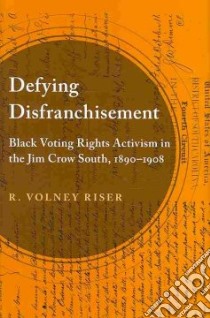Defying Disfranchisement - 9780807136386
Un libro in lingua di Riser R. Volney edito da Louisiana State Univ Pr, 2010
- € 39.00
- Il prezzo è variabile in funzione del cambio della valuta d’origine
"As the oppressive grip of massive disfranchisement and segregation closed on the South in the late nineteenth century, black citizens did not sit passively by. In the lost social and legal history recovered in Defying Disfranchisement, R. Volney Riser reveals how black citizens mobilized collective efforts to resist disfranchisement through the only institutions potentially available, the courts. Before there were formal organizations, such as the NAACP, to organize these efforts, there were courthouse janitors willing to lead the challenge to disfranchisement, and a nationally linked network of lawyers cobbled together to pursue their claims to rightful citizenship. Their tale ends in tragedy, as the Supreme Court abandons them to the forces of oppression, and Riser's book brings back to life this important chapter in the legal and political history of this bleak era."---Richard Pildes, coauthor of The Law of Democracy: Legal Structure of the Political Process
"Defying Disfranchisement is a major work of historical reclamation. Riser provides the missing pages in the struggle of African Americans in the South for the right to vote before the founding of the NAACP.He reminds us of the late nineteenth-and early twentieth-century black lawyers who fought so valiantly against the odds in the courts."---Mary Frances Berry, author of And Justice for All: The United States Commission on Civil Rights and the Continuing Struggle for Freedom in America
In the late nineteenth and early twentieth century, Jim Crow strengthened rapidly and several southern states adopted new constitutions designed primarily to strip African American men of their right to vote. Since the Fifteenth Amendment to the United States Constitution prohibited eliminating voters based on race, the South concocted property requirements, literacy tests, poll taxes, white primaries, and white control of the voting apparatus to eliminate the region's black vote almost entirely. Desperate to save their ballots, black political leaders, attorneys, preachers, and activists fought back in the courts, sustaining that resistance until the nascent NAACP took over the legal battle.
In Defying Disfranchisement, R. Volney Riser documents a number of lawsuits challenging restrictive voting requirements. Though the U.S. Supreme Court received twelve of these cases, that body coldly ignored the systematic disfranchisement of black southerners. Nevertheless, as Riser shows, the attempts themselves were stunning and demonstrate that African Americans sheltered and nurtured a hope that led to wholesale changes in the American legal and political landscape.
Riser chronicles numerous significant anti-disfranchisement cases, from South Carolina's Mills v. Green (1985), the first such case to reach the Supreme Court, and Williams v. Mississippi, (1898), the well-known but little-understood challenge to Mississippi's constitution, to the underappreciated landmark Giles v. Harris---described as the "Second Dred Scott" by contemporaries---in which the Court upheld Alabama's 1901 state constitution. In between, he examines a host of voting rights campaigns waged throughout the country and legal challenges initiated across the South by both black and white southerners. Often disputatious, frequently disorganized, and woefully underfunded, the anti-disfranchisement activists of 1890-1908 lost, and badly; in some cases, their repeated and infuriating defeats not only left the status quo in place but actually made things worse. Regardless, they brought attention to the problem and identified the legal questions and procedural difficulties facing African Americans.
Rather than present southern blacks as victims during the roughest era of discrimination, in Defying Disfranchisement Riser demonstrates that they fought against Jim Crow harder and earlier than traditional histories allow, and they drew on their own talents and resources to do so. With slim ranks and in the face of many defeats, this daring and bold cadre comprised a true vanguard, blazing trails that subsequent generations of civil rights activists followed and improved. By making a fight at all, Riser asserts, these organizers staged a necessary and instructive prelude to the civil rights movement.
Informazioni bibliografiche
- Titolo del Libro in lingua: Defying Disfranchisement
- Sottotitolo: Black Voting Rights Activism in the Jim Crow South, 1890-1908
- Lingua: English
- Autore: Riser R. Volney
- Editore: Louisiana State Univ Pr
- Collana: (Hardcover)
- Data di Pubblicazione: 24 Gennaio '10
- Genere: HISTORY
- Argomenti : African Americans Suffrage Southern States Voter registration Southern States African American political activists
- Pagine: 326
- ISBN-10: 0807136387
- EAN-13: 9780807136386


